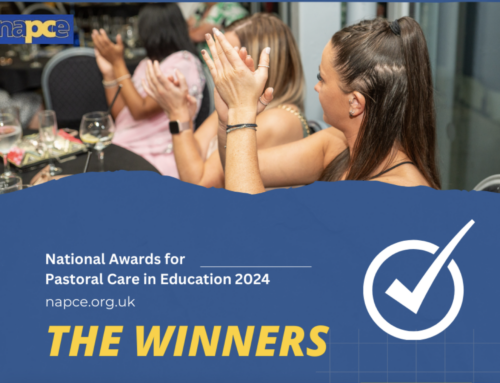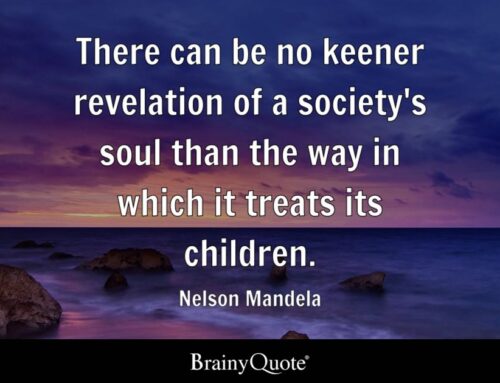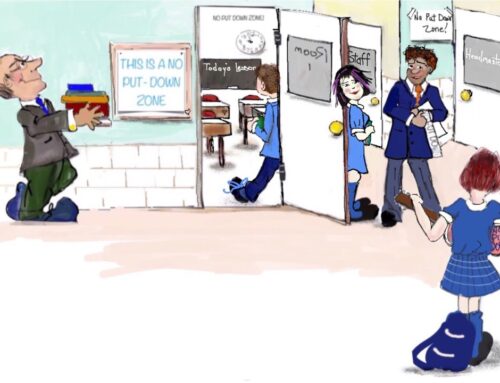Respect4us is based in Norfolk, England, and is an alternative educational service for high school students. It provides for young people who find mainstream school a challenge and whose behaviour reflects this. The pupils who attend have often been suspended or excluded from school or are chronic truants. Because of the increasing focus on an inflexible academic curriculum in the UK more and more students are finding that ‘regular’ schooling is not for them and schools keen to ‘maintain standards’ are pleased to be shot of them. Respect4us is consequently growing across the county. Schools are obliged to meet the needs of their students so are willing to pay for this alternative provision.
So what happens there that is so different? The curriculum is geared to student interest and although many activities are practical, creative or sport related there is still a focus on basic skills. It might surprise their original teachers to see students sit around a table and quietly work at individual programs of study. Although there are occasional wild moments the overall atmosphere is clearly purposeful and the timetable well planned. A wide variety of activities are on offer and no-one is forced to do what they feel uncomfortable with. Students also learn basic life and social skills – how to deal with everyday things that most young people confront at some time or another. They are taught to think through getting organised, how to work as a member of a team, and ways to deal with conflict. They also learn how to set themselves up as entrepreneurs, skills they might need to run their own businesses in due course. Many go onto vocational courses and the aim is for noone to leave Respect4us as a member of the NEET community (shorthand for Not in Employment, Education or Training). So far they have been outstandingly successful in this. They have been on the news many times, recognised in the Observer national newspaper as one of Britain’s 50 New Radicals and one of their students awarded The Prince’s Trust Educational Achiever of the Year 2012.
I used to teach students with emotional, social and behavioural difficulties and the background and experience of many of those young people were much the same as the students I met in Respect4us. These are ‘double whammy kids’, many of whom deserve a medal just for getting up in the morning. The experiences in their young lives included rejection, neglect, abuse and mental health difficulties. And yet all of them were coming to school, enjoying the experience, learning and leaving with a qualification or two.
Student voice
I was privileged to spend an afternoon at Respect4us and spend time with students finding out what they thought about the differences between their old school and this one. I was particularly interested in how they felt about the differences in teacher-student relationships, as this is the one thing that stands out so powerfully in John Hattie’s meta-analysis of over 800 meta-analyses of effective education (Hattie, 2009). In what ways did Respect4us live up to its name?
To help the conversation going I used Symbol Cards (from St Luke’s Innovative Resources) and asked students to pick up one or more that represented what happened in their old school and then a couple that represented their experiences in Respect4us. What they said was not that unexpected but nevertheless powerful and at times surprisingly thoughtful and articulate. With their permission I taped their responses. This is a summary of the discussion around the symbols of a pair of scales, a coiled spring, a birthday cake, a heart, a bridge, a cloud (representing a pile of poo!), a magic wand, a book, a tennis racket and a padlock.
The school environment
The students were fierce in their condemnation of their previous school (hence the ‘pile of poo!’) Having been rejected by this institution this is unsurprising but something that stood out for these students was how overwhelming they had found the larger environment. One student said it was ‘just chaos’ and another that they couldn’t cope with being pushed by so many people in the corridors. Their difficult behaviour either saw them joining in with ‘everyone bouncing around’ or screaming for others to get out of their way. There was an element of not coping that had translated into aggression, non-compliance and/or explosive behaviours. Considering the multiple adversities that young people with emotional difficulties are often dealing with it might be anticipated that a noisy, demanding, confusing and impersonal environment would be the trigger for such responses. One student picked up a question mark to represent his old school saying that he didn’t know what it was for.
Two students who had spent time in ‘isolation’ talked about the experience as being in a prison without support or friends.
“You always feel trapped, in a cage, in a prison, four walls that’s it.”
One student said that he liked it when it was quiet – and hated the chaos that had been the hallmark of regular school. – “It’s a lot more chilled out here”.
One of the teachers at Respect4us said that sometimes he had to pinch himself in the mornings because of how quiet it was in the class with everyone working, the opposite of what one might have expected and apparently the opposite of what often happens in mainstream school.
Freedom and choice
Respect4us represents freedom for students, freedom to make choices, to go out and not be confined to the walls of a school building. Although there are some fairly strict guidelines and high expectations for work, the students see themselves as choosing what they do rather than having something imposed on them by an inflexible system. I asked one student what made him knuckle down at Respect4us when he wouldn’t at school
“it’s the way the staff are, very easy-going, not constantly saying you’ve got to do this, you’ve got to do that.”
The word ‘ comfortable’ was said often and it appears to be a spur to engage in problematic behaviour when students are asked to do something that makes them feel uncomfortable. Knowing that no-one will try and ‘make’ them do anything and will provide support and help when needed, appears to enable these vulnerable and challenging young people make a choice to engage with learning.
Learning
And by and large they want to learn! One girl acknowledged that her attitude left a lot to be desired but also that learning was important.
“I had a shit attitude and was never willing to do anything. But when I was in my class I wanted all the learning I could get because I’d missed out. I wanted to get my grades.”
“I do want to know stuff. They have helped me with spelling here cos you have these worksheets and you have as much time as you want and they help you… there is someone to help if you get stuck.”
Another commented on how he missed the one teacher he thought was a good guy in his old school – and missed the science classes that he had enjoyed with him:
“I could learn with him, I got really good grades in science.”
The students did know that they were limiting their choices by not being at mainstream school but valued the way Respect4us helped them move towards a positive future.
“You don’t get to learn the same as a mainstream school, you don’t have the same chances when you leave school. This place is a bridge to somewhere else. They help get you a job, help set up a bank account.”
Conversations about ‘what next’ are clearly part of the input that Respect4us provides and it was impressive how some students were developing plans for their future and aware of the steps they needed to take to get there.
High expectations and nurturing
The research on resilience indicates three important environmental factors (Werner 2004). One is a sense of belonging, another is having someone believe in the best of you and the third is high expectations and help to achieve these. All of these factors were illustrated in the statements that students made about Respect4us and especially the way they were treated by staff. In mainstream school the focus had primarily been on their behaviour, here it was more on their learning.
“They want you to learn, teachers in other schools don’t seem to care if you learn or not.”
One student said that he knew that teachers in Respect4us had his best interests at heart and were not just following their own agenda.
The framework of caring relationships appears to hold the ambivalence of students who struggle and promote their motivation and willingness to try where before they had failed.
“You feel loved here – I do anyway. They make you feel you are part of something. At your old school you don’t feel comfortable. Here you are comforted, you get along with other people, you don’t have nagging teachers, they like you and they tell you they like you. They make you feel like you’re their own child and look after you. It helps with your learning. They care for you and you don’t feel they think you’re shit. I want to be somewhere where I feel more comfortable.”
This also mirrors Nel Noddings’ definition of an ethical teacher-student relationship where the best self of the teacher seeks a caring relationship with the best self of the student (Noddings, 1992).
Fairness and trust
One student immediately selected a pair of scales to represent how important fairness was to him. He said that the one teacher he admired in his old school ‘never treated anyone different’ and that this place treats me fairly. When I commented that fairness was clearly important to him, he responded emphatically ‘yes, it is’. I wondered where that came from and he said it was about how you would treat yourself. When one of the teachers came in he commented that sometimes the student in question complained about things being unfair to which the student replied – well that’s what I say but I know for a fact that it is – it is fair here. I asked him if he was ever unfair to others and he acknowledged that he could be – but that he thought about it and didn’t want to upset people who he believed were fair to him.
Trust was a two way street. Students felt that many mainstream teachers could not be trusted to do as they promised and that they as students were never given trust. People expected the worst of them rather than the best.
The provision of food
Food is a marker of care – for everyone. Staff who are give a good lunch on professional development days feel valued and are more open to the learning on offer. In Respect4us the students are provided with breakfast that they get for themselves and also a home-cooked lunch. This was significant – one girl said she needed two cards to represent her current experiences, one for food and one for sport.
“You get food, proper cooked hot food.”
Another chose a picture of cake.
“And this is a cake because on my birthday they bought me two birthday cakes (this was said with a big smile). And when we were out they bought me hot chocolate.”
When I asked this student how this made her feel she responded:
“Special. We get rewarded, loved, they talk to you as if you were actually their own kid“
Every day a new day as opposed to living out a reputation
The students spoke about how in mainstream school their reputation went before them and that they were unable to shake off this history and labelling. They said that although they were occasionally promised a ‘fresh start’ this didn’t happen
In high school they tell you it’s a new beginning, forget your past but on my induction day one of the teachers said ‘is that the girl that kicked off in her last school?’
The students appreciated that they were being given a second chance – often over and over again. Because of this they felt accepted for who they were and able to make changes.
“You may have bad days but here they forget about it. You come back and it’s a new start. Every single day.”
“When you do something wrong it gets written down and that’s how it’s dealt with – it never gets talked about again”
Magic
What is happening at Respect4us is, according to one of the students who picked up a symbol of a wand, a piece of magic.
“This is because it’s magical here – you get treated like everyone is there for you, people help you, they sort your problems out, anything said gets dealt with.”
The research is clear about the relevance of an emotionally safe school climate, the significance of a positive and caring teacher-student relationship in learning outcomes and the importance of promoting connectedness for mental health. Respect4us is demonstrating that evidence in practice.
Many of the young people who end up in alternative educational provision have had experiences that would knock most people sideways. But when that alternative provision is working to get these youngsters back on track, break negative intergenerational cycles and enhance resilience – and having positive outcomes for some of the most challenging young people in education, we should be taking note.
Yes, Respect4us has a higher teacher-student ratio and less of the performance pressure than teachers in mainstream schools have to deal with – but the staff there are changing lives by believing in students, looking past their behaviour to what they might become and showing them the care and connection many of them clearly need and seek. Surely at least some of this everyday magic is replicable across all schools?
References
Hattie, J. (2009) Visible Learning: A synthesis of over 800 meta-analyses relating to achievement. London and New York: Routledge.
Noddings, N. (1992) The challenge to care in schools: an alternative approach to education. New York, Teachers College Press
Werner, E.E. (2004) What can we learn about resilience from large-scale longitudinal studies? In Handbook of Resilience in Children. New York: Kluwer Academic/Plenum







